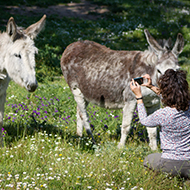Worst year for sightings reports wildlife organisations
Sightings of England’s most threatened farmland bird, the turtle dove, have significantly declined this year due to last summer’s extremely wet weather, according to experts.
Official figures show that turtle doves have declined by 80 per cent since 1995. However, reports show that this summer’s population is likely to be lower than ever.
It was revealed by BirdTrack, an online project that uses data from thousands of volunteer wildlife recorders, that turtle dove sightings featured in just two per cent of recorders’ lists in May, compared with 3.5 per cent last year.
Dr Jenny Dunn, a conservation scientist for the Royal Society for the Protection of Birds (RSPB), said: "Last summer was the wettest in living memory, and it is no surprise that this has had an impact on turtle doves."
The species faces a number of threats, including hunters in Europe and North Africa, and changes in farming practices in both the UK and Africa, where they spend their winter.
However, research being conducted in East Anglia has shown positive breeding success this year with more chicks surviving and leaving the nest than last year.
"We are extremely worried that if we cannot work out how to save them the familiar purr of this beautiful bird will never again be heard in our countryside," added Dr Dunn.
Operation Turtle Dove has been launched by the RSPB, Natural England, Pensthorpe Conservation Trust and Conservation Grade, to research the causes of the decline and put emergency measures in place.
This includes studying the migration routes of turtle doves to sub-Saharan Africa, in order to target conservation work on their winter grounds, and by helping UK farmers sow seed-rich plots on turtle dove breeding grounds.






 RCVS Knowledge has called on vet practices to audit their post-operative neutering outcomes.
RCVS Knowledge has called on vet practices to audit their post-operative neutering outcomes.
